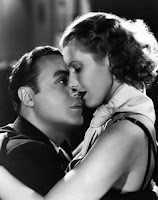Watchingwell Curated classic films

Love is in the Air.....
What's your favorite love story? I am curious as to why the great love stories always have to be sad -- if they don't end sadly, prolonged suffering is required. In the first category, I would place the tortured love of Heathcliff and Cathy in Wuthering Heights (1939, Samuel Goldwyn Company) which one could watch just to hear Laurence Olivier say, "It occurs to me I have not yet congratulated you on your marriage." English never sounded so elegant. Unless you are listening to Ronald Colman and Greer Garson in Random Harvest (1942, Metro Goldwyn Mayer) from the second category -- talk about your prolonged suffering. Of course, long-suffering love can be very entertaining -- think of Rhett and Scarlett in Gone With the Wind (1939, A Selznick International Picture in association with Metro-Goldwyn-Mayer), Charlotte and Jerry in Now Voyager (1942, Warner Bros.), and Ilsa and Rick in Casablanca (1942, Warner Bros.).
 Less known in this category is the weep fest In Name Only (1939, RKO Radio Pictures). In this moving love story, mean old Kay Francis tries to keep Cary Grant from leaving her for Carole Lombard. Cary and Carole look good together, and Kay outdoes herself illustrating justifiable adultery and everyone experiences prolonged suffering.
Less known in this category is the weep fest In Name Only (1939, RKO Radio Pictures). In this moving love story, mean old Kay Francis tries to keep Cary Grant from leaving her for Carole Lombard. Cary and Carole look good together, and Kay outdoes herself illustrating justifiable adultery and everyone experiences prolonged suffering.
Another great romance you may not have seen is History is Made at Night (1937, Walter Wanger Productions) with a luminous Jean Arthur and suave Charles Boyer, whose difficult love story is plagued by obstacles, like her vengefully jealous husband and their ship hitting an iceberg . Here are two more of the most recognizable voices in film. Jean Arthur's wavering pitch and Charles Boyer's deep, French-accented velvet.
Speaking of the French (they invented romance, you know), there are some quintessentially French examples of the genre that one should see, from the modern era. Gigi (1958, Metro Goldwyn Mayer), from the Colette novella, with Leslie Caron, Louis Jordan, Maurice Chevalier and Hermione Gingold, is the story of a young girl dealing with the conventions of love in Paris of the belle epoque, with a witty Lerner and Loewe score. The Umbrellas of Cherbourg (1964, Parc Film-Madeleine Films-Beta Film), with a young Catherine Deneuve and beautiful art direction is about young love, separation and moving on, all sung to a score by Michel Legrand. The one that particularly tugs at my heartstrings is Fanny (1961, Warner Brothers), adapted from the Marseilles Trilogy by Marcel Pagnol, starring Leslie Caron, Maurice Chevalier, Charles Boyer, again -- well, they are French, and Horst Buchholtz, who is not, and the familiar story of young love, separation, and moving on. The score, the photography, and the acting are outstanding, particularly, an older Charles Boyer, who was nominated for an Academy Award, as was the music, the cinematography, and the film.
So, what about love stories that are not sad? They are called comedies. The scripts are meant to be witty and the romance serves this purpose As much as we appreciate the wonderful It Happened One Night (1934, Columbia Pictures), a similar plot was used at least twice more, in Love on the Run (1936, Metro Goldwyn Mayer) and The Bride Came C.O.D. (1941, Warner Bros.). In 1935, however, Carole Lombard and Fred MacMurray starred in the amusing, and touching, Hands Across the Table (Paramount Pictures) in which manicurist Carole tries not to give up plans to marry for money when Fred spends a few nights in her flat. A few sleepless nights while the two try to resist the mutual attraction show us why these two worked so well in the four films they made together.
Clearly, the variety of human tastes in love and romance cannot be adequately captured in one list, but let's not forget the not-human or used-to-be human variety. One delightful love story takes place between Gene Tierney and Rex Harrison as a ghost in The Ghost and Mrs. Muir (1947,Twentieth Century Fox). The more I see this film, the more I appreciate it. The score by Bernard Herrmann is as good as anything he did for Hitchcock.

Then there are the canine sweethearts in Lady and the Tramp (1955, Walt Disney Productions). Who doesn't love this piece of Disney magic?
And I must mention the sweet, robot love story in Wall-E (2008, Walt Disney Pictures, Pixar Animation Studios). See this work of animation art if you haven't.
I leave you with some notable scenes from master directors that I bring to your attention in case you've forgotten them. This is how Joshua Logan, George Stevens, Alfred Hitchcock, and Billy Wilder made our hearts flutter.
Joshua Logan (Picnic, Columbia Pictures, 1955)
George Stevens (The More the Merrier, Columbia Pictures, 1943)
Alfred Hitchcock (Notorious, RKO Radio Pictures, 1946)
Billy Wilder (Love in the Afternoon, Billy Wilder Productions, 1957)






No comments:
Post a Comment